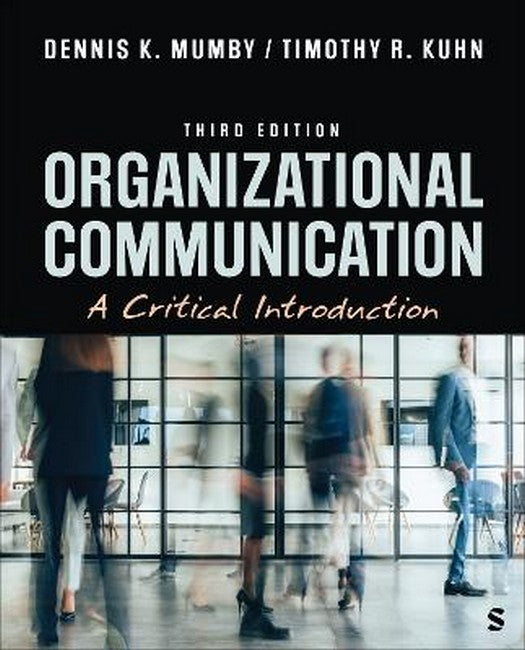Dennis K. Mumby is the Cary C. Boshamer Distinguished Professor of Communication at The University of North Carolina at Chapel Hill, USA. His research focuses on the communicative dynamics of organizational control and resistance under neoliberalism. He is a Fellow of the International Communication Association, and a National Communication Association Distinguished Scholar. He has authored or edited 7 books and over 60 articles in the area of critical organization studies, and his work has appeared in journals such as Academy of Management Review, Management Communication Quarterly, Organization Studies, Organization, and Human Relations. He is past chair of the Organizational Communication Division of NCA, and an 8-time winner of the division's annual research award. He has served as chair of the Organizational Communication Division of the International Communication Association, and is a recipient of the division's Fredric M. Jablin Award for contributions to the field of organizational communication.
Request Academic Copy
Please copy the ISBN for submitting review copy form
Description
Preface Acknowledgments About the Authors Part I: Conceptualizing: A Critical Communication Perspective On Work And Organizations Chapter 1: What Is Organizational Communication? Defining Organizational Communication: The Communication-Organization Relationship Organizations as Communicative Structures of Power Conclusion Critical Applications Chapter 2: Studying Organizational Communication Critically Understanding Theory in the Critical Analysis of Organizational Communication Unpacking the Critical Approach Understanding Organizational Communication From a Critical Perspective Conclusion Critical Applications Part II: Contextualizing: A History Of Theorizing Work And Organizatons Chapter 3: Fordism And Organizational Communication I: Classical Theories The Fordist Organization Fordism And Scientific Management Fordism And Bureaucracy Conclusion Critical Applications Chapter 4: Fordism And Organizational Communication II: The Human Relations School Placing Human Relations Theory In Its Historical Context Fordism, Mayo, And Human Relations Theory Mary Parker Follett: Bridging Theory And Practice Fordism And Human Resource Management Conclusion Critical Applications Chapter 5: Organizations as Communication: Systems and Constitutive Views Situating the Systems Perspective The Principles of the Systems Perspective The Communicative Constitution of Organization Conclusion Critical Applications Chapter 6: Communication, Culture, and Organizing The Emergence of the Cultural Approach Three Perspectives on Organizational Culture Conclusion Critical Applications Part III: Applying: A Critical Communcation Approach To Work And Organizations In The 21st Century Chapter 7: Post-Fordism And Organizational Communication The Fall Of Fordism And The Rise Of Post-Fordism Neoliberalism As An Economic System Neoliberalism As A Hegemonic Discourse Post-Fordist Work: A New Organizing Model Communicative Work And Communicative Capitalism Conclusion Critical Applications Chapter 8: Communicating Gender At Work The Four "Waves" Of Feminism Critical Feminism: Viewing Organizations As Gendered Conclusion Critical Applications Chapter 9: Communicating Difference At Work Defining Difference at Work Putting Difference and Workplace Diversity in Historical Context Difference and Diversity in the Contemporary Workplace Interrogating Whiteness and Organizational Communication Conclusion Critical Applications Chapter 10: Branding, Work, And Organization Branding And Capitalism In The 20th Century The Evolution Of Branding: Three Models Work, Branding, And The Enterprise Self The Ethics Of Branding Conclusion Critical Applications Chapter 11: Leadership Communication in the New Workplace Traditional Perspectives on Leadership New Approaches to Leadership A Critical Communication Perspective on Leadership Conclusion Critical Applications Chapter 12: Information and Communication Technologies in and at Work Understanding Technology New Technologies, New Challenges ICTs and the Extension of the Workplace Conclusion Critical Applications Chapter 13: Globalization and Corporate Social Responsibility Defining Globalization Spheres of Globalization Organizing Against Globalization Globalization and Corporate Social Responsibility Conclusion Critical Applications Chapter 14: Organizational Communication And Meaningful Work Meaningful Work Meaningful Work And Identity The Future Of Work Conclusion Critical Applications

